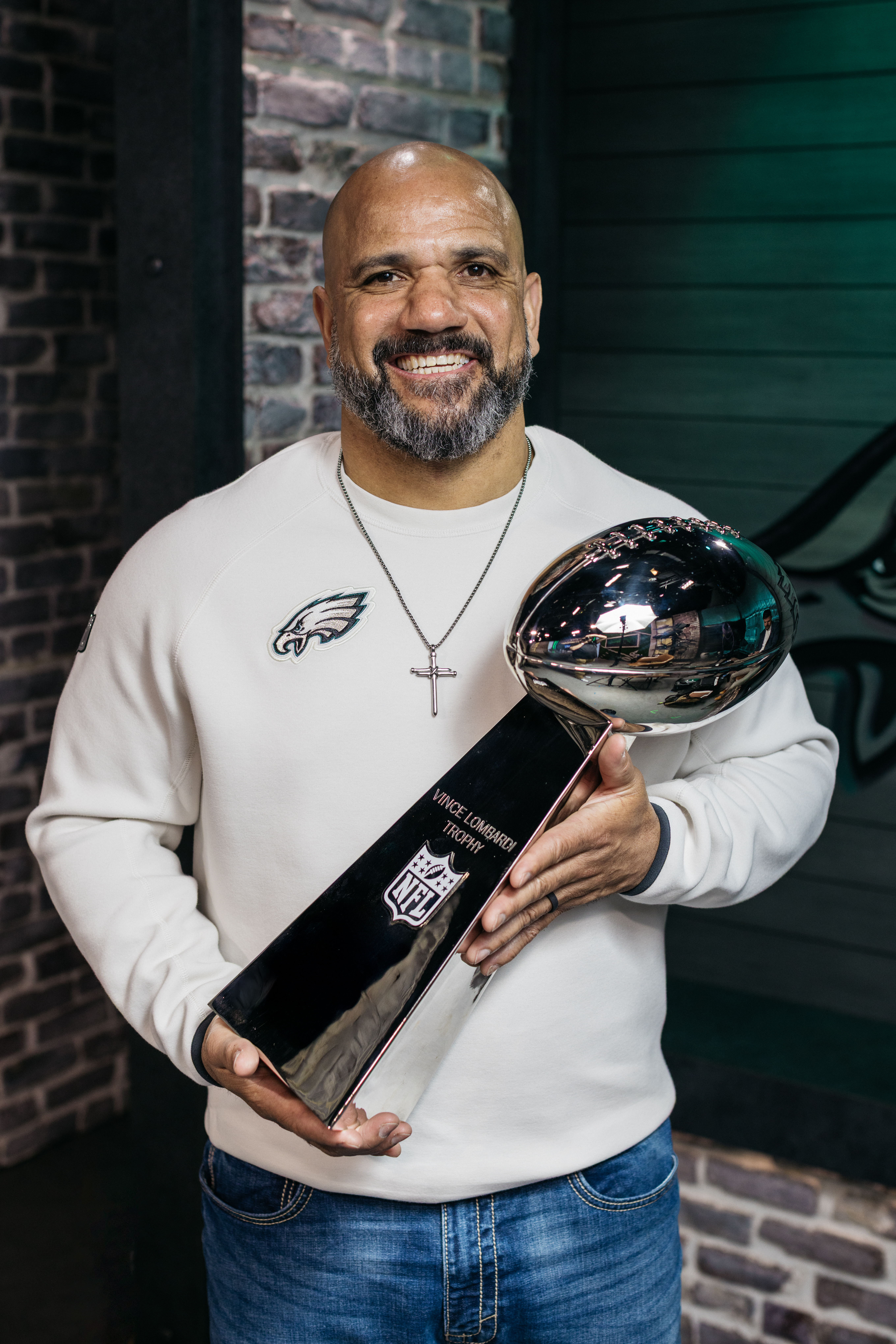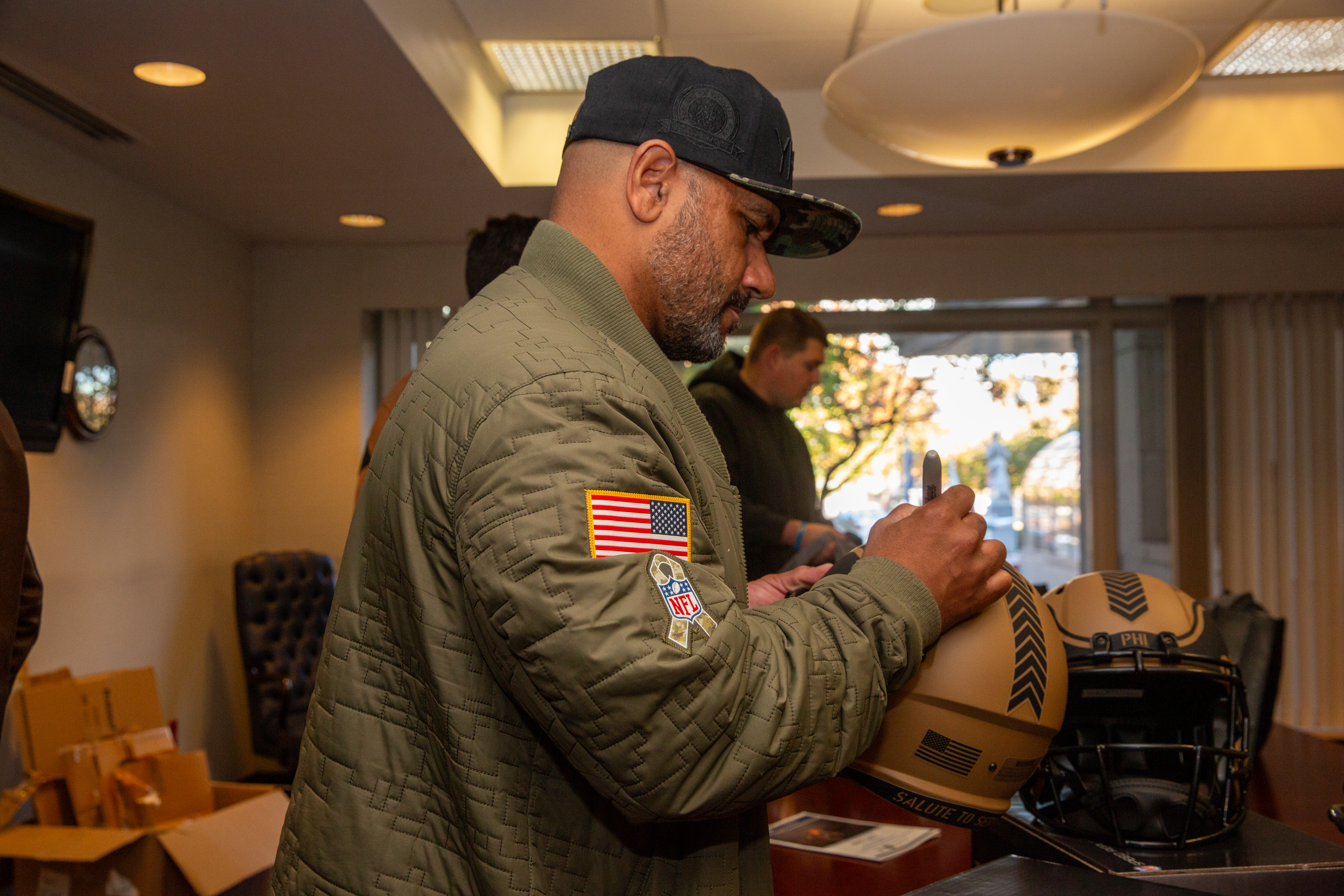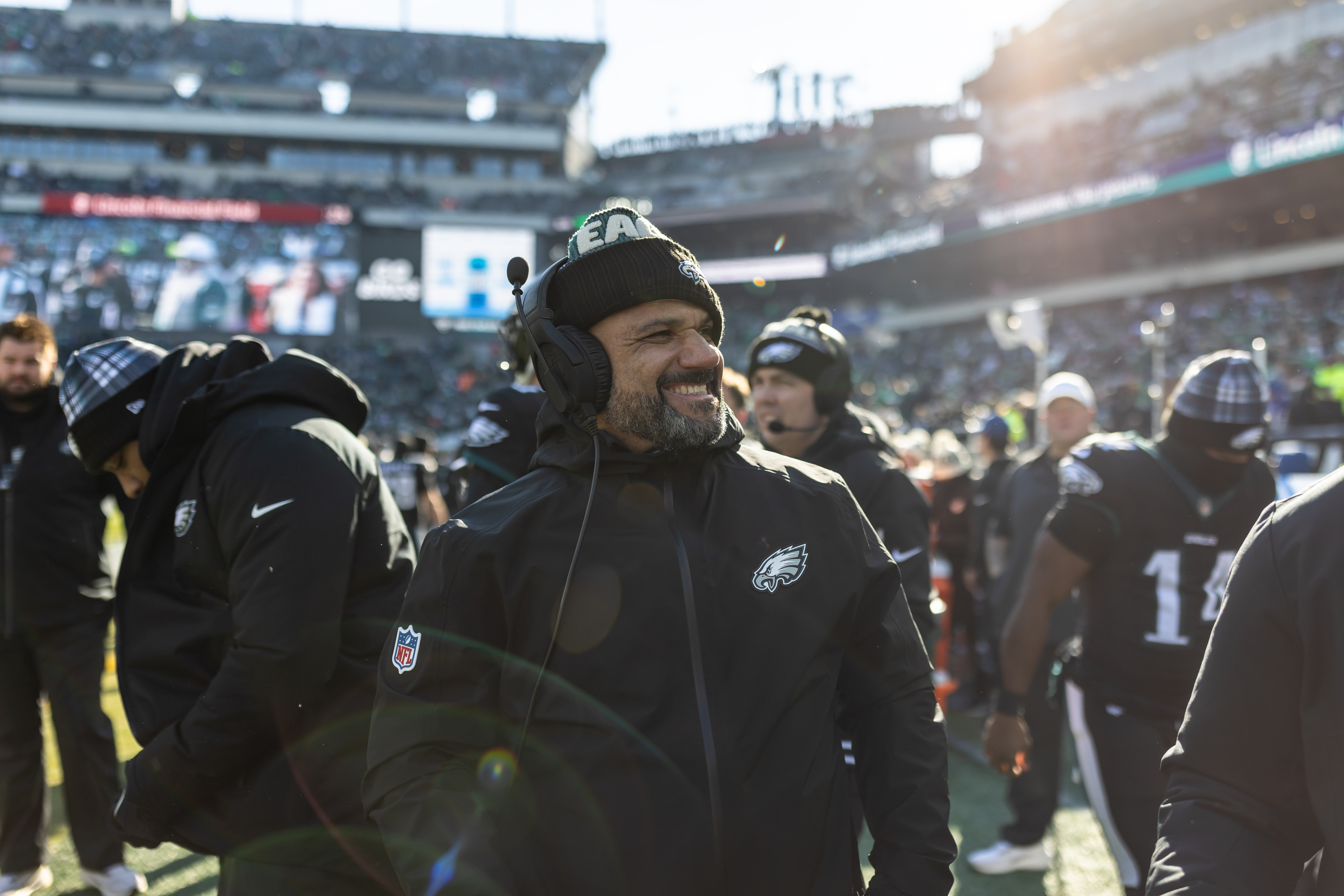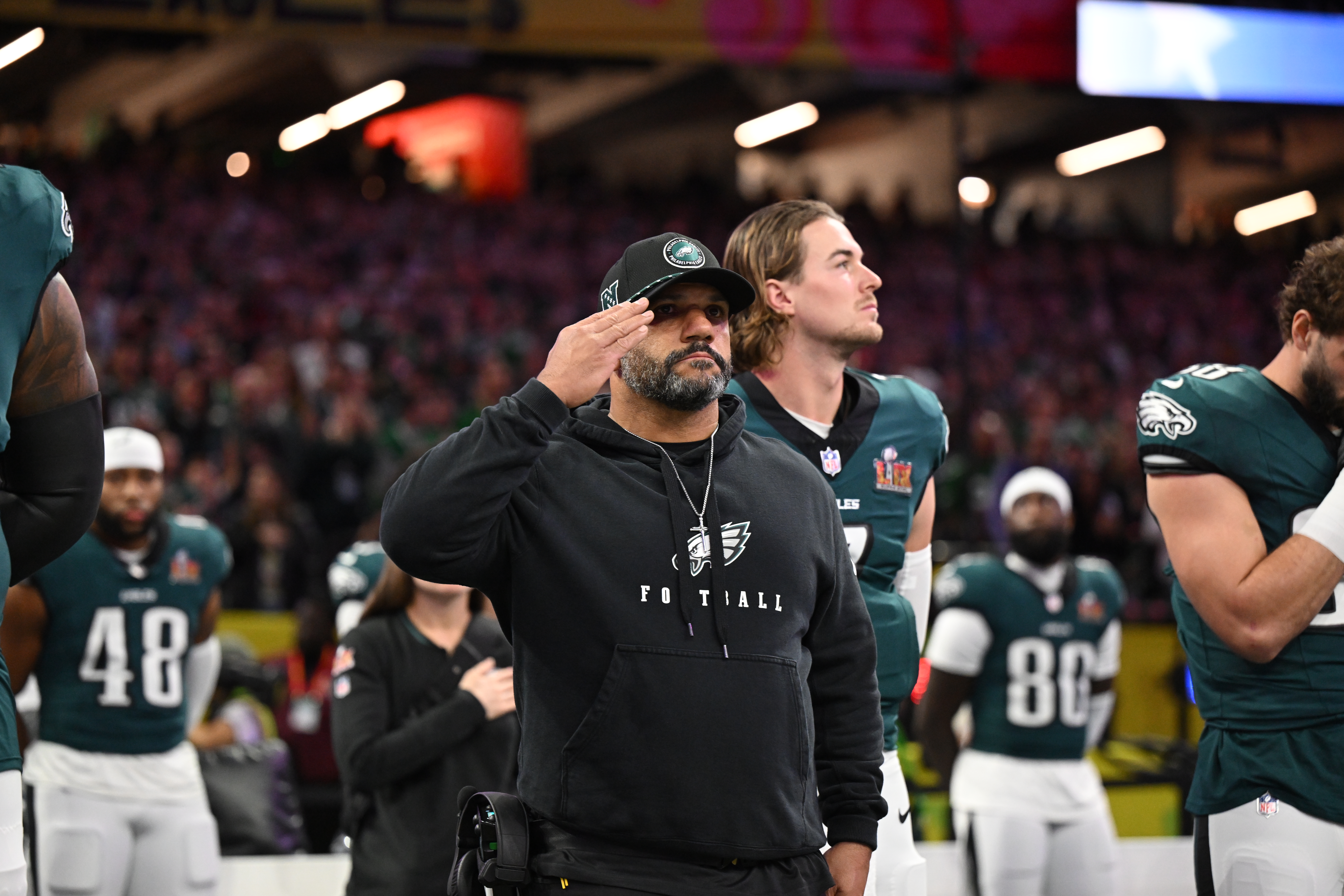Eagles Peak
Jemal Singleton ’99 soars in rarified air — and has the Super Bowl ring to prove it

Some dream of winning the Super Bowl and jetting off to Walt Disney World. Jemal Singleton ’99, on the other hand, leaves the impression he’d rather return to the U.S. Air Force Academy.
It’s not that the National Football League-champion Philadelphia Eagles running backs and assistant head coach equates the two — he says the Academy challenged him unlike any amusement park could — but his passion for his alma mater runs that deep.
In April, the Checkpoints team traveled to Philadelphia to visit with Singleton for this feature story and a Long Blue Leadership podcast interview. Singleton also took time from his busy schedule to meet with graduates for a Long Blue Line Social in the City of Brotherly Love.
“The fact that the school that I love wants to see what I’m up to and congratulate me — the support that I’ve had from the Academy over the years has been unbelievable. I feel like I’ve invested so much as a student, as an officer, as a coach, directly to that place. Now I’m a recruiter. I’m a recruiter for the Air Force Academy nonstop. I’m sitting where I’m sitting now at a pretty great place in a great city. … It all goes back to some of those lessons that I learned at the Academy.”
Different worlds

Singleton, while growing up, got a taste of military life thanks to his father — a Louisiana native who enlisted in the Air Force and made a career as a “diddy-bopper,” or Morse code specialist. Singleton’s father was stationed in Incirlik, Turkey, when Singleton was born. His English mother insisted Singleton have a Turkish name — hence the “e” in “Jemal” — and that he grow up with more interests than football alone.
“Talk about two ends of the spectrum,” he says of his adolescence. “My father was from Baton Rouge, kind of [a] rough upbringing. And my mother was this posh British lady from England who, to be honest, I never saw wear tennis shoes. I never saw her wear a pair of jeans, only skirts and heels and dresses. … Some of the things that I learned from my father growing up were street smarts, how to conduct yourself. And then some of the things that I learned from my mother, like etiquette training, I got before I got to the Academy.”
Singleton says being the perpetual new kid, along with his diverse upbringing, refined his social skills and allowed him to fit in in a variety of situations, benefiting him as he progressed through his coaching career.
“I can fit in and feel comfortable in a lot of different settings. When I was on the recruiting trail coaching, I could go to a school in the South or I could go to [an] affluent school somewhere up North,” he says. “I can meet people on their level, in their area, however I need to be, and I think that’s definitely helped me connect with others.”
Graduating from high school in San Antonio, Texas, Singleton played linebacker. Prior to entering the Academy, he attended the USAFA Prep School, where he says he began to forge his leadership skills.
“I was a team captain in high school, but I never led away from my sport. The Prep School was really my first opportunity, and I learned a tremendous amount about leading your peers,” Singleton says.
He admits that he knew little to nothing about USAFA before attending the Prep School.
“I had good grades in high school and got a recruiting letter from the Air Force Academy,” he says. “And as crazy as this sounds, my dad was enlisted for 20 years, and I didn’t know the Air Force Academy existed. I didn’t know they had a football team, which is crazy, but that’s the truth. The more I learned about it, it was like, ‘Oh my gosh, this is an amazing opportunity.’”
He says the athletic and military training components came easily, but admits academics were a struggle.
“I had my priorities a little skewed,” he says. “So, that was a really good lesson for me, failing academically and having to buckle it up a little bit and change my ways.
“But all of those pieces — the intertwining of athletics, military training — were awesome. You talk about a place that is setting you up for success.”
Singleton says the Academy provided him with opportunities no other college student outside of a military academy receives, from basic training to leading his flight, from flying gliders to jumping out of airplanes.
“I did everything as a cadet in order to do the things that my buddies who went to other schools weren’t doing right then,” he says. “On top of that, I was playing college football.”
From challenger to champ
Singleton doesn’t remember the first time he picked up a football, but he says one was always close by. He recalls running around his family’s large living room as a young child in San Antonio, pigskin in hand, while his older brother by eight years chased him.
“Football’s kind of always been there,” he says, adding he started playing tackle football at 7 years old and found athletics to be the best way to connect with his peers. And the passion he found for the game only grew.
As a Falcon running back and special-teams member, Singleton competed at the highest level of collegiate football — a dream come true. But he did face challenges.
He recounts a particularly heartbreaking moment as a cadet-athlete:
It’s a Thursday night during Singleton’s three-degree year and the Falcons are taking on Colorado State University at the Academy. The intrastate rivalry is being broadcast on ESPN.
“I’m leading the nation in kickoff return yards,” Singleton recalls. “There’s this hype about Singleton returning kicks and all this. No. 1; I’m the best in the nation, right?”
The Falcons, on track to win the Western Athletic Conference, placed him in the end zone to return a kickoff.
“I should have taken a knee,” he says. “I was a bit deep, and I should have stayed in the end zone, but I brought the ball out and fumbled. And then I had another play on the sideline before halftime and I fumbled, so I have two fumbles in the same game.”
A devastated Singleton knew his errors cost the team the conference championship.
“That happened early in my career, and really that’s when my mindset changed,” he says. “You can get caught up in the hype, people telling you how good you are. … I was a young, naive, selfish player who did some things in my self-interest and didn’t have the team’s interest at heart.”
Growing stronger from the experience, Singleton says that scar tissue has presented teaching opportunities for players he now leads. The walls of the NovaCare Complex, the Eagles’ training facility, are covered in posters demonstrating proper ways to secure the football, with the nomenclature for each.
“Hopefully they don’t have to experience that same pain,” he says.
But that pain was relatively short-lived. During Singleton’s firstie year, the Falcons earned division and conference championships and went on to win the Oahu Bowl, ending the season with a 12-1 record. The 1998 team was recently inducted into the school’s Athletics Hall of Fame.
“To be on a team to go down as one of the best that has ever played at the Air Force Academy was awesome,” he says. “And to be a team captain was amazing.”

Full-circle moment
As for his subsequent coaching career, Singleton “got lucky,” he says.
In 2000, Fisher DeBerry, the legendary Falcons head coach, picked Singleton and seven other lieutenants to help lead the Prep School’s team for a year. The young officer was hooked.
Though initially interested in flying the A-10 Thunderbolt II, Singleton later realized the 10-year service commitment could prevent him from ever coaching football. He earned a degree in social sciences and spent a few years as a public affairs officer. But the gridiron was his calling.
“I fell in love with it,” he says. “We used to joke that we were the highest paid graduate assistants because we were lieutenants.”
Singleton had begun introductory flight training but decided to give up his pilot slot and pursue a career in football. He returned to the Academy in 2003 as the executive officer for the athletic director and, after just a few months in that position, DeBerry requested that Singleton be reassigned to work with him as a military coach from 2003 to 2006.
In January 2006, Singleton took the USAFA running backs coach job and separated from the Air Force that summer.
“So really kind of a full-circle moment — the guy I played for was also the guy who gave me my first job in the coaching profession,” he says. “I’m so thankful for [DeBerry], the things he did for me as a player, the things he did for me afterward, the text messages that I still get to this day from him and the conversations we have.”
Singleton coached the Falcons as a civilian from 2006 until 2011 and then left for a job with Oklahoma State University. The University of Arkansas came calling next and recruited Singleton as its running backs coach and special teams coordinator.
Coaching opportunities with the NFL soon followed. Beginning in 2016, Singleton helped lead the Indianapolis Colts, the then-Oakland Raiders and the Cincinnati Bengals before ending up in his current position with the Eagles.
“I’ve been here now going on my fifth season; the longest tenure I’ve had with an NFL team has been here with the Eagles,” he says.
He adds that, without a doubt, the last year has been his favorite as a football coach.
On Feb. 9, the Eagles, in the team’s second Super Bowl appearance with Singleton in a coaching position, defeated the Kansas City Chiefs 40-22 (the Chiefs defeated the Eagles 38-35 in Super Bowl LVII two years ago).
“You go from losing a Super Bowl, which is ultimately probably the most pain I’ve had in my career,” he says, “to winning a Super Bowl, which is one of the most joyful things that I’ve had in my career. We’ve experienced both ends of the spectrum — I kind of like winning.”
He adds, “Very rarely in the NFL do you have the opportunity to sit back and go, ‘Man, we just won,’ because [the games are] all close. Well, that one wasn’t close. In the fourth quarter, we’ve got our backups in and it’s like, ‘Oh my goodness, we’re going to win the Super Bowl!’ It was an amazing moment.”
Singleton says, “Once you’ve experienced the pinnacle — oh my goodness! I want it to be that way all the time.”
And the moment was made all the sweeter thanks to the Eagles fan base.
“Philly, to me, is unbelievable,” he says. “The fans are passionate. Yeah, this is a tough place to coach; this is a tough place to play if you’re not winning. I think the standards here are set extremely high, and they should be. … This is a fan base that will travel, that will support you, that will let you know when things aren’t going well. I’ll never forget my first year here getting booed in the preseason. … But I love Philly; it’s a great city.”
Singleton plans to be back with the Eagles for the 2025-26 NFL season, and is looking to bring home the Lombardi Trophy two years in a row.
And beyond that?
“I mean, obviously, an opportunity to run a program, whether collegiate or at the NFL level, would be cool; it would be a true test of leadership,” he says. “Friends tell me they’re going to make me be a pastor after my career. The jobs are similar — a couple of pastor friends joke that we’re the same. “People think the only day we work is Sundays.
“So, we’ll see,” he says. “I don’t want to do anything else but what I’m doing right now.”

